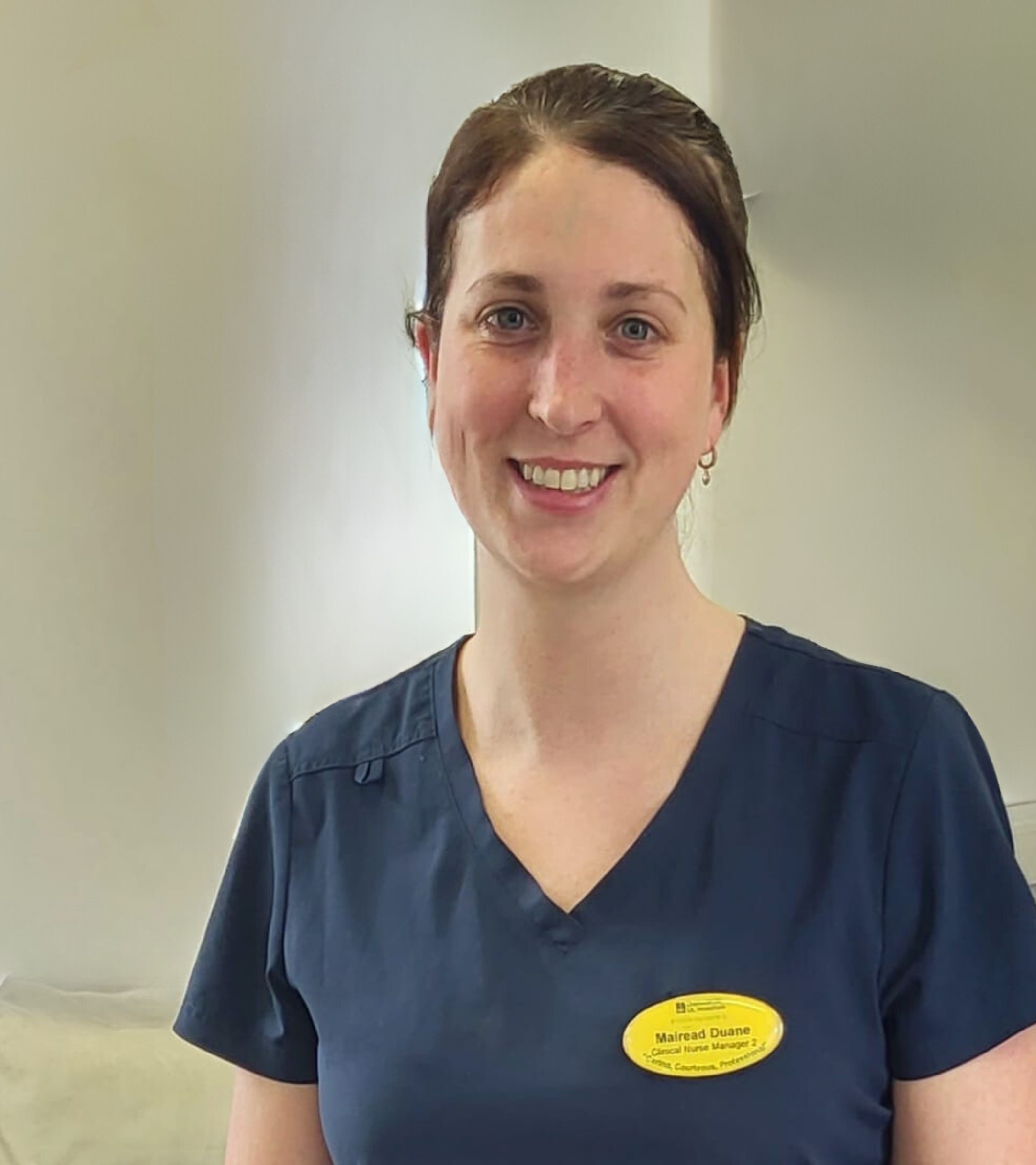A day in the Life – Mairead Duane, CNS, Rheumatology

My name is Mairead Duane, Clinical Nurse Manager in the Rheumatology Unit in Croom Orthopaedic Hospital. I joined the Rheumatology Infusion Unit/Day Ward in March 2022. This was a new role that was developed to manage an expanding service. I had spent most of my career to that point working in a medical ward at University Hospital Limerick, where I gained invaluable experience as well as making the most amazing friends along the way.
Coming from an Acute Medical Ward in UHL to managing a high-activity Day Service was a huge change. However, I was very lucky because the service, which covers four of the five sites in UL Hospitals Group, was so well-developed. Our team consists of four consultant Rheumatologists — Professor Sandy Fraser, Dr Joe Devlin, Dr Alwin Sebastian, Dr Kieran Murray -- one SPR, six Registrars, two Advanced Nurse Practitioners, three Clinical Nurse Specialists, two infusion nurses, myself and secretarial support.
The Infusion Unit has four infusion chairs and one procedure bed. Our infusion clinic operates for four days, enabling us to infuse 20 to 25 patients per week. We use a wide range of drugs to treat many rheumatic conditions, including many types of arthritis. People who are impacted by autoimmune disease may also suffer from respiratory, gastroenterological and dermatology disorders, which are also treated here in the Unit. In my previous role, I had never realised the broadness of Rheumatology—I really am learning something new every day.
Our day starts at 7.45am. We have six patients for infusion every morning. The infusion nurses, Breeda McCarthy, Marie O Neill, and I plan and prepare for the day ahead. We also discuss the events of the weekend, primarily hurling. As the only Cork member of a very strong Limerick team, this conversation ends quickly, and it’s back to setting up for the day!
Our infusion patients attend on a regular schedule so we get to know them, their stories and their family lives. But most importantly, we get to know their condition. We almost instantly know if they are having a ‘flare’ of their disease. Recently, one attending lady was told us how swelling and stiffness in the joints were affecting her ability to complete daily tasks. After her infusion and assessment by Dr Anisah Farouk, she received a steroid injection to aid her symptoms. We’re fortunate to have a doctor during infusion hours who can immediately attend to such issues. It relieves pain and means that the patient will not have to attend her GP or the Emergency Department, thus reducing the burden on those services.
Our valued Clinical Nurse Specialist team (CNS), Siobhan Morrissey, Helen Fitzgerald and Elaine Fitzgerald, provide patient education and health promotion to new patients who are commencing treatment. We providing a phlebotomy service here in the Unit, ensuring that new patients are seen in a timely manner and are followed up appropriately. The CNS team also manages a very busy advice line.
In the afternoon, we commence our Ultrasound Injection Clinic led by Dr Alwin Sebastian. This service diagnoses and guides the treatment plan for the attending patient, including infusion therapy.
One regular phone call of the multiple calls we receive is from our Advanced Nurse Practitioner, Mary Brady. While reviewing patients at her nurse-led clinic, she will often ask us to book a patient for emergency review. This is a fantastic service that runs four days a week, providing patients with rapid access to treatment and assessment.
Our day ends at 6pm. Although I mainly manage the infusion side of the unit, the many different services provided by the department means that my role is quite diverse. It will require working closely with the clerical staff Patsy Power and Marie Galvin and Jackie Condron in the admissions office due to the planning required to run the service efficiently. Due to our patients being immunocompromised, there is a huge focus on Infection, Prevention and Control practices. MargaretCarroll, one of our many Multi Task Attendants (MTAs), attends to this with great vigour.
My favourite part of my job is seeing how life-changing these drug therapies are for our patients. Hearing how these people can work, holiday and enjoy everyday life makes it so worthwhile. The patients are so grateful for the care they receive. They also enjoy the personable and fun atmosphere that we are so lucky to have in the Unit!
Our aim and focus is to continue to expand our department and the services it provides. We are hoping to establish a new unit along with multi-disciplinary team support which would be a huge benefit to our patients. As a Unit which once operated only two days a week, we now run a five-day service. Our remarkable team, which is strongly nurse-led, is something that I am very proud to be involved in.
The most memorable moment of my career so far was being involved in the refurbishment of my previous ward in UHL. This was a huge achievement, involving a lot of work, and the boost to staff morale from this change in environment is something I will always remember.
As a Clinical Nurse Manager, it’s extremely important to be fair to and appreciative of your staff at all times. And as a nurse, it’s vital to always remember the basics of nursing care, and talking and listening to your patient.
------------------------------------------
Rheumatology is the speciality of autoimmune and inflammatory diseases that primarily affect the body's musculoskeletal system — joints, muscles, tendons, ligaments. Rheumatologic disorders may also affect the blood vessels, skin, nerves, eyes and most internal organs. Rheumatic and Musculoskeletal disorders are a group of more than 200 different conditions that affect 1 in 4 people of all ages, equivalent to 1.2 million Irish citizens (www.eular.org).
Infusion therapies help reduce inflammation in the joints, relieve pain, prevent or slow down joint damage, reduce disability and enable you to be as active as possible.
Infusion therapy is a type of prescription therapy for multiple Rheumatic disorders that uses biologic agents, medications that are made of living organisms and cells, to help alter how the immune system works therefore reducing inflammation and disease. A person may use the therapy on its own or as part of a combination of therapies with oral medications.
Infusion therapy uses an intravenous line to slowly administer the medication directly to the bloodstream. The duration of the infusion is dependent on the type of medication and condition being treated. It can range from one to four hours.
For more info visit:

